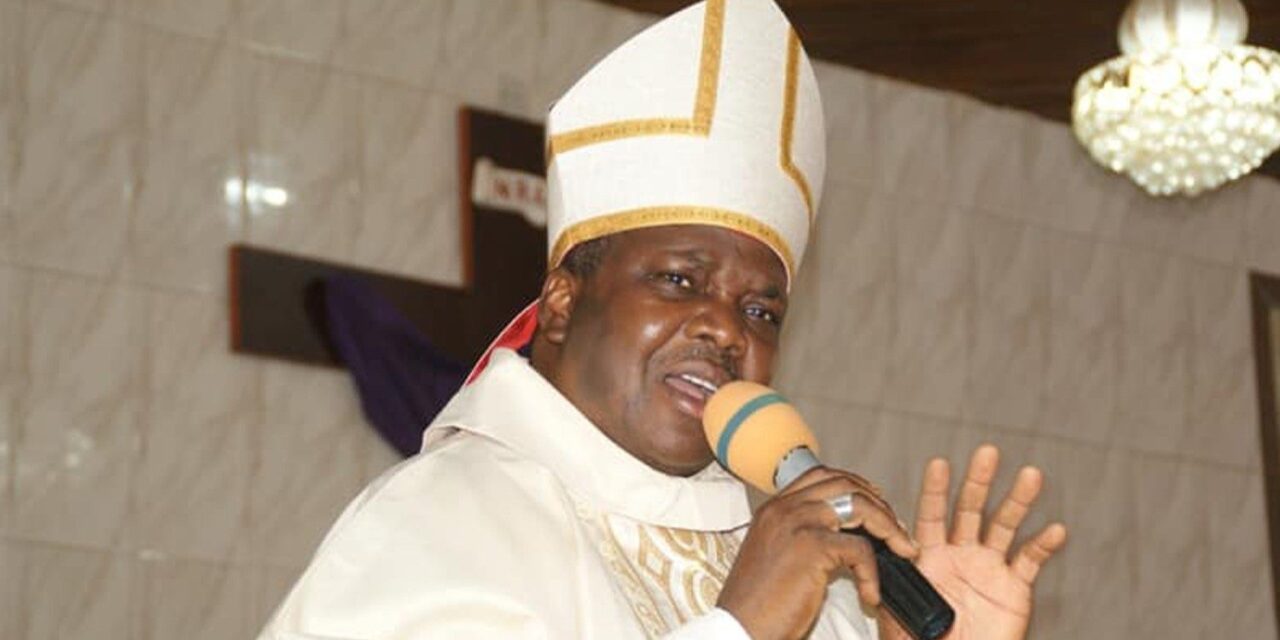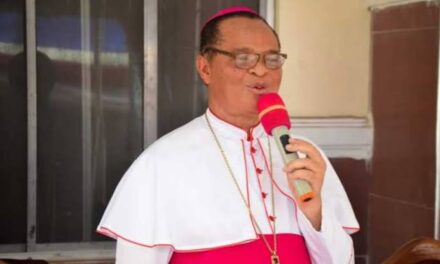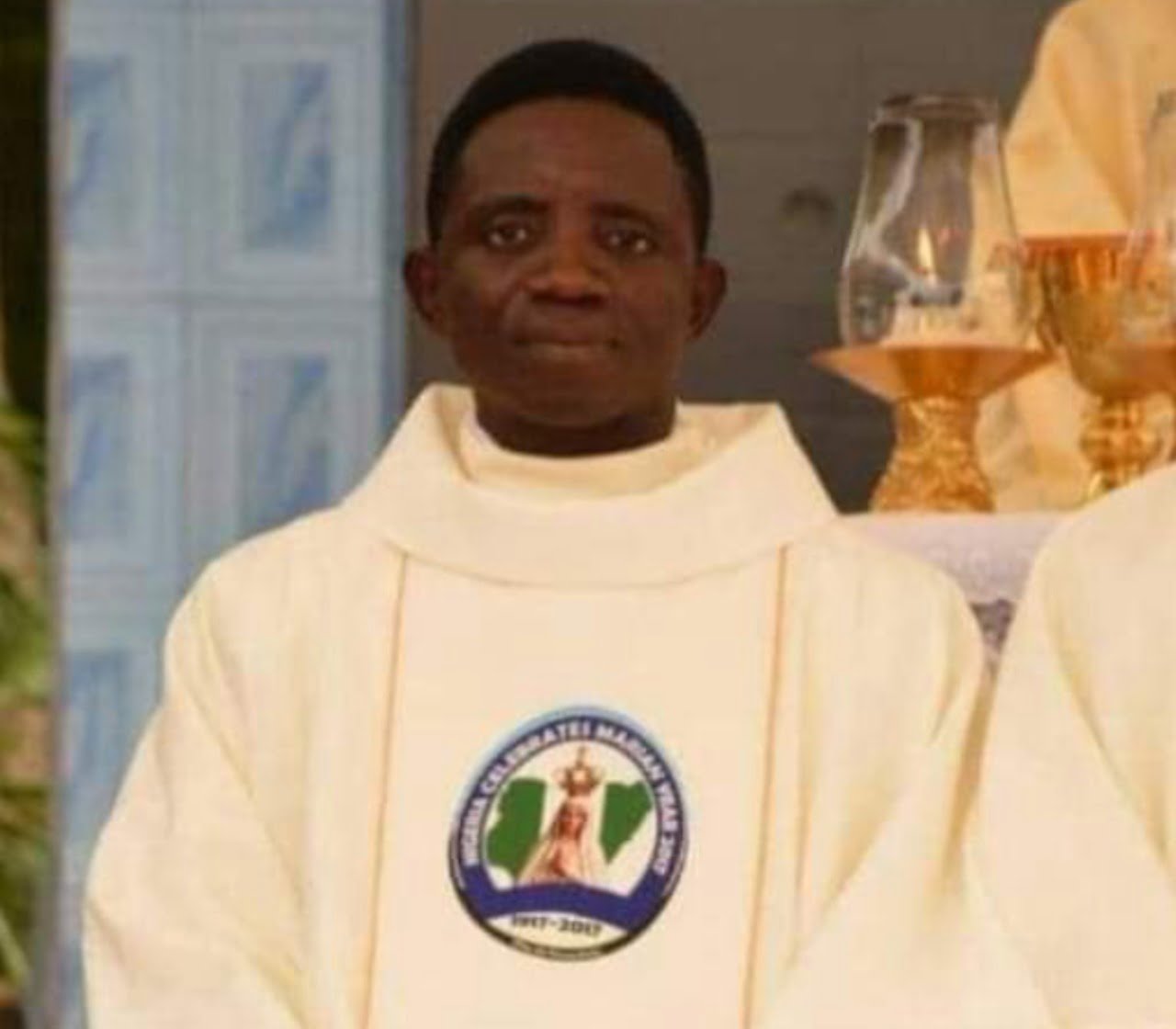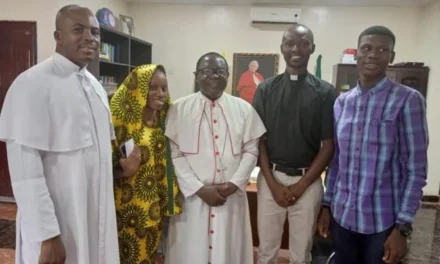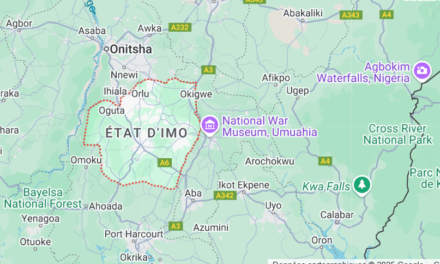Suivant cette définition, on est contraint de croire que l’Église catholique est saturée de SANCTOSONOGRAPHS. Rappelons-nous que les préparatifs en cours du Synode sur la synodalité inspirent une nouvelle « énergie dans l’apostolat de la communication pastorale de l’Église » à travers le continent africain, a déclaré un évêque catholique du Nigeria. Dans sa présentation aux membres du Dicastère du Vatican pour les Communications lors de leur Plénière du 10 au 12 novembre à Rome, Mgr Emmanuel Adetoyese Badejo a exprimé sa gratitude au Saint-Père « pour le refrain qui revient toujours depuis le début du processus de synodalité, qui n’est pas de laisser personne derrière.
« Le synode et la communication sont déjà un grand défi en Afrique », a déclaré Mgr Badejo dans sa présentation. Dans le texte de la présentation, qu’il a partagé avec ACI Afrique le lundi 14 novembre et mis à la disposition de l’AGENCE DE PRESSE RECOWACERAO, RECONA, l’évêque catholique nigérian a ajouté : « Nous sommes reconnaissants parce que le Synode a en fait inspiré une nouvelle énergie dans l’Église. l’apostolat de la communication pastorale, dans toute l’Afrique.
« L’Église africaine a toujours chéri les thèmes qui reviennent dans le Synode sur la synodalité, les thèmes de la participation, de la communion et de la mission », a-t-il déclaré, faisant référence au thème du Synode, que le Saint-Père a prolongé jusqu’en 2024. Mgr Badejo, nommé membre du Dicastère du Vatican pour la communication en décembre 2021, a rappelé que « le premier Synode des évêques pour l’Afrique en 1994, a eu lieu alors que le génocide se déroulait au Rwanda et que l’Église en Afrique avait encore le courage de choisir pour son thème pastoral : L’Église comme famille de Dieu en Afrique.
« Participer et travailler ensemble est toujours un désir que l’Afrique a toujours eu », a déclaré Mgr Badejo, qui a ajouté : « Les thèmes qui sont apparus dans le Synode sur la synodalité et le processus de synodalité ont aidé l’Afrique à redynamiser les valeurs que l’Église avait déjà.
L’Ordinaire du lieu du diocèse d’Oyo au Nigéria, qui est également président du Comité épiscopal panafricain pour les communications sociales (CEPACS), a ajouté : « Les valeurs que nous avons mentionnées ici donnent une voix à tous ceux qui travaillent ensemble, ne laissant personne de côté et écoutant l’un un autre, tout le thème de l’écoute a fait partie de l’Afrique.
« C’est exactement ce qui se passe dans une bonne famille. Dans une bonne famille, seuls les individus s’écoutent, et même lorsqu’il y a des divergences, la famille ne se brise pas forcément, elle a donc fait partie de l’Afrique et c’est pourquoi nous sommes heureux de nous approprier le thème paru dans le document préparatoire du Synode : Ubuntu », a-t-il déclaré.
L’évêque nigérian de 61 ans qui a commencé son ministère épiscopal en octobre 2007 en tant qu’évêque coadjuteur du diocèse d’Oyo a ajouté : « Il y a un proverbe africain qui dit que celui qui ne veut pas apprendre même du fou ne peut jamais être complètement sage. Cela signifie que même un fou a quelque chose d’utile à apporter à la communauté et si vous n’êtes pas prêt à l’écouter, vous ne pouvez jamais vraiment être complètement sage.
Il a poursuivi : « Le Dicastère pour les Communications a pour tâche la restructuration, la réorganisation et la consolidation globales de toutes les réalités qui, de diverses manières jusqu’à présent, ont traité les communications afin de répondre toujours mieux aux besoins de la mission. de l’église. » Mgr Badejo a déclaré que « la plénière a été une énorme expérience d’apprentissage pour l’équipe africaine » et que « la réalité et l’expérience africaines ont été dûment mises en évidence compte tenu de la façon dont les Africains présents à la plénière ont souligné que dans l’esprit même de la synodalité, aucune partie de l’Église ne devrait être laissé pour compte dans le processus.
« La plénière a également reconnu à quel point les valeurs et la vision du monde de l’Afrique complètent vraiment l’esprit du Synode sur la synodalité, à savoir la communion, la participation et la solidarité », a-t-il poursuivi, ajoutant : « Le défi pour l’Église en Afrique est d’exploiter toutes les ressources de communication, du traditionnel au numérique, pour mener à bien sa mission ». Les évêques Badejo ont déclaré que les communicateurs catholiques sont mis au défi « de tirer parti de manière créative des thèmes et des objectifs du Synode sur la synodalité, d’établir un réseau solide entre toutes les composantes de la communication sur le continent pour collaborer avec le réseau de l’Église universelle coordonné par le Dicastère pour les communications. « Dans sa présentation lors de la session plénière de trois jours qui s’est terminée le 12 novembre, Mgr Badejo a souligné l’importance d’engager la jeunesse africaine dans les médias.
Il a déclaré : « Nos jeunes ont l’énergie, la générosité et la présence dans les médias numériques pour pouvoir dialoguer avec les médias à chaque étape, même lorsque l’évêque dort, faisant sa sieste l’après-midi ». Le chef de l’Église catholique a ajouté qu’en engageant les jeunes dans les médias numériques, « nous devons nous préoccuper de la formation éthique ». Tout comme « les professionnels et les praticiens des médias » sont censés adopter l’éthique des médias, il y a un besoin de « formation éthique qui puisse également aider ceux qui utilisent ou s’engagent avec les médias de manière décontractée », a déclaré Mgr Badejo.
O diretor da RECOWACERAO NEWS AGENCY, RECONA acaba de receber este artigo do personagem dramático, um gigante da comunicação no continente africano e um guru intelectual. Um bispo que não requer nenhuma introdução na comunidade dos bispos mundiais. Este erudito estudioso afirmou que o Sínodo inspira “nova energia na comunicação pastoral da Igreja” na África. Pode-se melhor alinhar esta afirmação com o vocabulário mais recente cunhado no recém-concluído Congresso Eucarístico na Nigéria por um de seus melhores homens de letras de todas as idades, o arcebispo Anthony JV Obinna. A palavra que acaba de passar no teste do léxico inglês resume o objetivo desta mensagem. A palavra SANCTOSONOGRAPHY diz tudo. Até agora, define-se como a representação de mensagens, modelos, melodias e imagens edificantes e saneantes, de acordo com o espírito de santidade e a dignidade ideal do ser humano.
Seguindo essa definição, somos constrangidos a acreditar que a Igreja Católica está saturada de SANCTOSONÓGRAFOS. Recordemos que os preparativos em curso para o Sínodo sobre a sinodalidade estão inspirando uma nova “energia no apostolado da comunicação pastoral da Igreja” em todo o continente africano, disse um bispo católico na Nigéria. Em sua apresentação aos membros do Dicastério do Vaticano para as Comunicações durante a plenária de 10 a 12 de novembro em Roma, Dom Emmanuel Adetoyese Badejo agradeceu ao Santo Padre “pelo refrão que sempre voltou desde o início do processo da sinodalidade, que não é deixar ninguém para trás.”
“Sínodo e comunicação já são um grande desafio na África”, disse Dom Badejo em sua apresentação. No texto da apresentação, que ele compartilhou com a ACI África na segunda-feira, 14 de novembro e disponibilizado à AGÊNCIA DE NOTÍCIAS RECOWACERAO, RECONA, o bispo católico nigeriano acrescentou: “Estamos gratos porque o Sínodo realmente inspirou uma nova energia na Igreja apostolado da comunicação pastoral, em toda a África”.
“A Igreja africana sempre apreciou os temas que surgem no Sínodo sobre a sinodalidade, os temas da participação, da comunhão e da missão”, disse ele, referindo-se ao tema do Sínodo, que o Santo Padre estendeu até 2024 O bispo Badejo, que foi nomeado membro do Dicastério para a Comunicação do Vaticano em dezembro de 2021, lembrou que “o primeiro Sínodo dos Bispos para a África, em 1994, ocorreu quando o genocídio acontecia em Ruanda e a Igreja na África ainda tinha a coragem de selecionar pelo tema pastoral: A Igreja como família de Deus na África”.
“Participar e trabalhar juntos é sempre um desejo que a África sempre teve”, disse o bispo Badejo, e acrescentou: “Os temas que apareceram no Sínodo sobre a sinodalidade e o processo da sinodalidade ajudaram a África a reenergizar os valores que a Igreja já tinha. »
O Ordinário Local da Diocese de Oyo, na Nigéria, que atua como Presidente do Comitê Episcopal Pan-Africano para as Comunicações Sociais (CEPACS), disse ainda: “Os valores que mencionamos aqui dão voz a todos que trabalham juntos, não deixando ninguém para trás e ouvindo um outro, todo o tema da escuta faz parte da África”.
“Isso é exatamente o que acontece em uma boa família. Em uma boa família, só os indivíduos se ouvem, e mesmo quando há diferenças, a família não necessariamente se desfaz, por isso fez parte da África e é por isso que estamos felizes em possuir o tema que apareceu no documento preparatório do Sínodo: Ubuntu”, disse ele.
O bispo nigeriano de 61 anos, que iniciou seu ministério episcopal em outubro de 2007 como bispo coadjutor da diocese de Oyo, acrescentou: “Há um provérbio africano que diz que quem não está disposto a aprender, mesmo com o louco, nunca pode ser completamente sábio. Isso significa que até mesmo um louco tem algo útil para contribuir com a comunidade e se você não estiver pronto para ouvi-lo, nunca poderá ser completamente sábio.”
Ele continuou: “O Dicastério para as Comunicações tem a tarefa de reestruturar, reorganizar e consolidar globalmente todas as realidades, que de várias maneiras até o presente lidaram com as comunicações para responder cada vez melhor às necessidades da missão. da Igreja. » Dom Badejo disse que a “plenária foi um grande aprendizado para a equipe africana” e que “a realidade e a experiência africana foram devidamente destacadas, pois os africanos na plenária apontaram que, no próprio espírito da sinodalidade, nenhuma parte da Igreja deve ficar para trás no processo”.
“O plenário também reconheceu como os valores e a visão de mundo da África realmente complementam o espírito do Sínodo sobre a sinodalidade, ou seja, comunhão, participação e solidariedade”, continuou ele, acrescentando: “O desafio para a Igreja na África é aproveitar todos os recursos de comunicação, do tradicional ao digital, para realizar sua missão.” Os bispos Badejo disseram que os comunicadores católicos são desafiados a “alavancar criativamente os temas e objetivos do Sínodo sobre a sinodalidade, estabelecer uma rede forte entre todos os componentes da comunicação no continente para colaborar com a rede da Igreja universal coordenada pelo Dicastério para as Comunicações . “Em sua apresentação durante a sessão plenária de três dias que terminou em 12 de novembro, Dom Badejo destacou a importância de envolver a juventude africana na mídia.
Ele disse: “Nossos jovens têm a energia, a generosidade e a presença na mídia digital para poder se envolver com a mídia a cada passo, mesmo quando o bispo está dormindo, tirando sua soneca da tarde”. O líder da Igreja Católica acrescentou que, ao engajar os jovens nas mídias digitais, “devemos nos preocupar com a formação ética”. Assim como se espera que “profissionais e praticantes da mídia” adotem a ética da mídia, há a necessidade de “formação ética que possa ajudar também aqueles que apenas usam ou se envolvem com a mídia casualmente”, disse o bispo Badejo.
The director of RECOWACERAO NEWS AGENCY, RECONA has just received this write-up from the dramatic persona, a Communication giant in the African continent and an intellectual Guru. A bishop who requires no introduction in the comity of World bishops. This erudite scholar affirmed that Synod Inspires “new energy in Church’s pastoral communication” in Africa. One can best align this assertion with the latest vocabulary coined at the just concluded Eucharistic Congress in Nigeria by one of their best men of letters of all ages, Archbishop Anthony JV Obinna. The word which has just passed the test of the English lexicon summarized the goal of this message. The word SANCTOSONOGRAPPHY says it all. So far, it is defined as the portraying of edifying and sanitizing messages, models, melodies, and images in accordance with the spirit of holiness and the optimal dignity of humans.
Following this definition, one is constrained to believe that the Catholic Church is saturated with SANCTOSONOGRAPHS. Let us recall that the ongoing preparations for the Synod on Synodality is inspiring a new “energy in the Church’s pastoral communication apostolate” across the African continent, a Catholic Bishop in Nigeria has said. In his presentation to members of the Vatican Dicastery for Communications during their November 10-12 Plenary in Rome, Bishop Emmanuel Adetoyese Badejo expressed appreciation to the Holy Father “for the refrain that has always come back since the Synodality process began, which is not to leave anyone behind.”
“Synod and communication is already a big challenge in Africa,” Bishop Badejo said in his presentation. In the text of the presentation, which he shared with ACI Africa on Monday, November 14 and made available to RECOWACERAO NEWS AGENCY, RECONA, the Nigerian Catholic Bishop added, “We are grateful because the Synod has actually inspired a new energy in the Church’s pastoral communication apostolate, all over Africa.”
“The African Church has always cherished the themes that come up in the Synod on Synodality, the themes of participation, of communion and of mission,” he said, making reference to the theme of the Synod, which the Holy Father has extended to 2024. Bishop Badejo who was appointed member of the Vatican Dicastery for Communication in December 2021 recalled that “the first Synod of Bishops for Africa in 1994, took place when the genocide was going on in Rwanda and the Church in Africa still had the courage to select for its pastoral theme: The church as the family of God in Africa.”
“Participation and working together is always a desire that Africa has always had,” Bishop Badejo said, and added, “The themes that have appeared in the Synod on Synodality and the synodality process have helped Africa to re-energize the values that the Church already had.”
The Local Ordinary of Nigeria’s Oyo Diocese who doubles as the President of the Pan African Episcopal Committee for Social Communications (CEPACS) further said, “The values that we mentioned here give a voice to everyone working together, not leaving anyone behind and listening to one another, the whole theme of listening has been part of Africa.”
“That’s exactly what happens in a good family. In a good family, only the individuals listen to one another, and even when there are differences, the family does not necessarily break up, so it has been part of Africa and that is why we are happy to own the theme that appeared in the preparatory document of the Synod: Ubuntu,” he said.
The 61-year-old Nigerian Bishop who started his Episcopal Ministry in October 2007 as Coadjutor Bishop of Oyo Diocese added, “There is an African proverb that says whoever is not willing to learn even from the madman can never be completely wise. That means even a madman has something useful to contribute to the community and if you are not ready to listen to him, you can never truly be completely wise.”
He continued, “The Dicastery for Communications has the task of the overall restructuring, reorganization, and consolidation of all of the realities, which in various ways up to the present have dealt with communications in order to respond ever better to the needs of the mission of the Church.” Bishop Badejo said that the “plenary was a huge learning experience for the African team” and that the “African reality and experience were duly highlighted given how Africans at the plenary pointed out that in the very spirit of synodality, no part of the Church should be left behind in the process.”
“The plenary also recognized how the values and the world view of Africa really complement the spirit of the Synod on synodality, namely communion, participation and solidarity,” he went on to say, adding, “The challenge to the Church in Africa is to harness all communication resources, from the traditional to the digital, to carry out her mission.” Bishops Badejo said that Catholic communicators are challenged “to creatively leverage the themes and objectives of the Synod on Synodality, establish a strong network among all components of communication in the continent to collaborate with the network of the universal Church being coordinated by the Dicastery for Communications. ”In his presentation during the three-day plenary session that concluded on November 12, Bishop Badejo highlighted the importance of engaging African youth in the media.
He said, “Our young people have the energy, the generosity, and the presence in the digital media to be able to engage with the media at every step, even when the bishop is asleep, having his afternoon nap.” The Catholic Church leader added that in engaging the youth in digital media, “We must be concerned about ethical formation.” Just as “professionals and practitioners of media” are expected to embrace media ethics, there is a need for “ethical formation that can help also those who just use or engage with the media casually,” Bishop Badejo said.
- CATHOLIC ARCHBISHOP IN GHANA HAILS POPE LEO XIV AS GOD’S GIFT - 23 mai 2025
- POPE LEO XIV TO APPROVE CANONIZATIONS - 22 mai 2025
- THE EVOLUTION OF PAPAL TRANSPORTATION - 20 mai 2025

